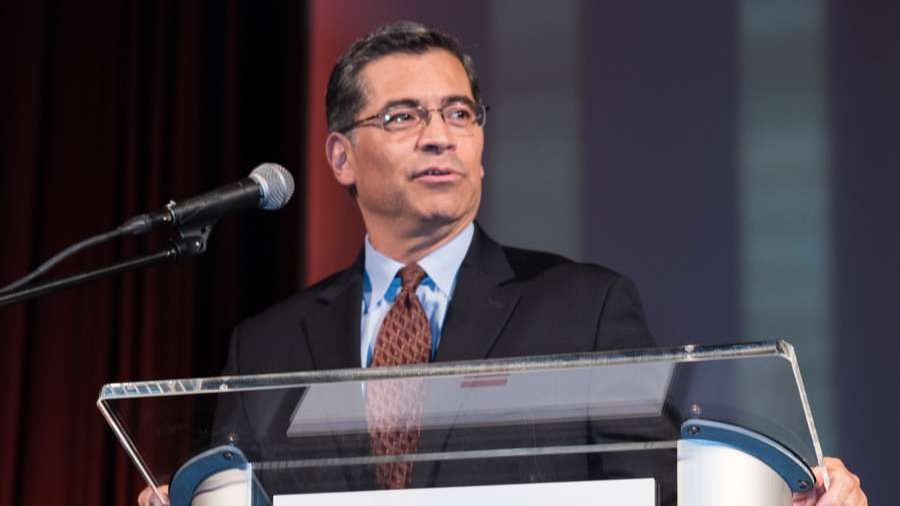Pro-life leaders have warned against Joe Biden’s “aggressively pro-abortion” pick to lead the Department of Health and Human Services. California Attorney General Xavier Becerra has a long track record in taking legal action against pro-life organizations.
Early Monday morning, President-elect Joe Biden announced he would tap Becerra as the next Health Secretary. If confirmed, Becerra would have a key role in crafting public health policy during a pandemic—but also would be making policy decisions on controversial social issues with far-reaching consequences.
“Far from ‘uniting’ the country, Biden has proven yet again he is an extremist on abortion,” said Marjorie Dannenfelser, president of the Susan B. Anthony List, of the pick. “Becerra is aggressively pro-abortion and a foe of free speech.”
Jeanne Mancini, president of the March for Life, tweeted on Monday that “With Joe Biden's pick of AG Becerra for HHS Secretary, we are seeing him make good on his promise to become the most radically pro-abortion president in history.”
As attorney general of California, Becerra has repeatedly fought Catholics and pro-lifers in court, including a loss at the Supreme Court in 2018, after the state tried to force pro-life pregnancy centers to advertise abortion services.
Becerra had defended the state’s Reproductive FACT Act, a law passed in 2015 before his tenure as attorney general, which required pro-life pregnancy centers to advertise for abortions. Pro-life groups claimed the state actively worked with the National Abortion Rights Action League (NARAL) to craft the legislation.
Becerra represented the state in the court battles against the legislation, which reached the Supreme Court; the court in 2018 struck down the law as a violation of the First Amendment.
Becerra’s predecessor Kamala Harris—now Vice President-elect—prosecuted journalist David Daleiden for his undercover videos claiming that Planned Parenthood unlawfully profited from the trade in fetal tissue of aborted babies. Becerra continued that fight in court.
Becerra also defended a 2014 state mandate that employers cover abortions in health plans, despite religious communities such as the Missionary Guadalupanas of the Holy Spirit not being exempted from the mandate.
In January, the Office of Civil Rights at the Department of Health and Human Services ruled that the state had violated the law in forcing groups to cover abortions against their conscientious beliefs. The office threatened to withhold federal funds to the state.
Becerra refused to comply with the HHS OCR demand. Now, if confirmed, he will be in charge of the entire agency.
Earlier in the pandemic, Becerra led a coalition of state attorneys generals to push for the Food and Drug Administration (FDA) to loosen its restrictions on the distribution of the abortion pill.
Biden’s selection of Becerra for HHS Secretary could provoke bitter fights with pro-life and Catholic groups in a number of areas, including the contraceptive mandate.
The Obama administration forced many religious non-profits—including the Little Sisters of the Poor—to provide coverage for contraceptives, sterilizations, and some abortion-causing drugs in their health plans.
While the administration offered an “accommodation” to objecting religious groups, by which the groups were purportedly allowed to opt-out of the mandate, the Little Sisters and others still said the procedure forced them to cooperate in morally-objectionable contraceptive coverage.
The Trump administration ultimately offered broad religious and moral exemptions to the mandate—which Becerra challenged and lost at the Supreme Court this summer in Little Sisters of the Poor Jeanne Jugan Residence v. California.
Biden has said he would restore the Obama administration’s “accommodation” for objecting groups—thus possibly reigniting a court battle with the Little Sisters of the Poor. If confirmed, Becerra as Health Secretary HHS would be at the center of this battle.
The agency could also once again marginalize the religious freedom concerns of pro-lifers in health care.
Pro-life groups initially appealed to the Obama administration’s health department following the 2014 California abortion coverage mandate. While the groups asked for the administration to enforce the Weldon Amendment against the state—which bars federal funding of health care groups that force the provision or coverage of abortions—the administration simply said that California had not violated the law.
There might also be fights over conscience protections in health care, under Sec. 1557 of the Affordable Care Act. The section prohibits discrimination in health care and the Obama administration interpreted it to mean that gender-transition surgeries could not be denied by health care workers if requested.
The administration’s “transgender mandate” was struck down by a district court in 2019, but Becerra’s confirmation to HHS could resurrect that court battle.
The Trump administration extended conscience protections for health care workers in federally-funded health care, but Becerra could roll back those protections as health secretary.
Other pro-life policies advanced by the HHS in the last four years included new Title X regulations, mandating that any clinic receiving Title X family planning grants not refer for abortions, nor could they be co-located with abortion clinics.
The administration also instituted a moratorium on new aborted fetal tissue research proposals conducted at NIH facilities, defended religious adoption agencies from mandates that they work with same-sex couples, required separate billing of abortion coverage in federally-subsidized health plans under the Affordable Care Act, and expanded restrictions of abortion funding in U.S. global health assistance. Becerra would be expected to oppose all of these policies as health secretary.
Becerra would need a majority of votes from the Senate for a confirmation. Control of the chamber is still undecided, with two special elections to be held in January in Georgia that will ultimately determine which party controls the chamber.
Sen. Tom Cotton (R-Ark.) said on Monday morning that he would vote against Becerra’s confirmation .
Dannenfelser said that the selection of Becerra “underscores the importance of winning in Georgia to prevent pro-abortion forces from taking control of the U.S. Senate.”

